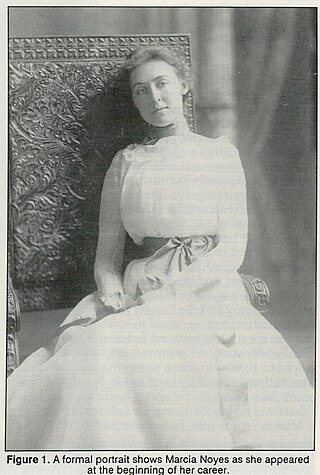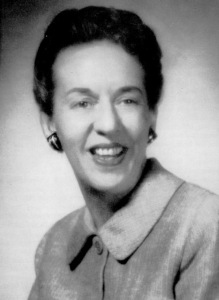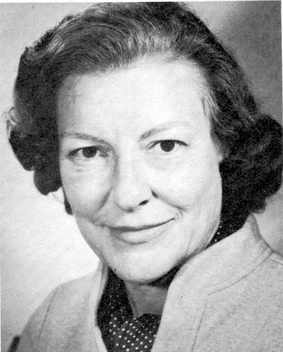Mary Louise Marshall (1893–1986) was Librarian and Professor of Medical Bibliography at Tulane University School of Medicine, and the longest-running president of the Medical Library Association (1941–46). [1] [2] [3]
Mary Louise Marshall (1893–1986) was Librarian and Professor of Medical Bibliography at Tulane University School of Medicine, and the longest-running president of the Medical Library Association (1941–46). [1] [2] [3]
Mary Louise Marshall was born on July 19, 1893, in Salem, Illinois. [4] The oldest of three children, she studied at the Illinois Women's College and Southern Illinois Normal University before completing her studies at the University of Wisconsin's Library School in 1914; [1] [5] the university did not grant library degrees at the time. [3] Marshall completed an internship at a public library where she earned $50 a month in wages and lived in the home of a faculty member. [5]
Around the time of World War I, Marshall worked at the library of Southern Illinois Normal University. In 1919, she left Illinois for New Orleans, LA where she became employed at the American Library Association's (ALA) War Library "scheme for soldiers not yet discharged from the armed forces." [1] When the New Orlean's ALA office closed, she took the position of librarian at the Rudolph Matas-Orleans Parish Medical Society Library, which later consolidated into Tulane University's Medical Library. She held a dual role as Professor of Medical Bibliography. [1] [2]
Marshall worked closely with fellow librarians Eileen Cunningham and Janet Doe on various projects. One project being the Handbook of Medical Library Practice, where Marshall authored a chapter on classification schemes. When the Army Medical Library, now the U.S. National Library of Medicine (NLM) needed a chairperson to lead a committee of librarians, medical scientists, and physicians to produce a classification scheme, which would later evolve into the National Library of Medicine classification, [1] [6] a library indexing system covering the fields of medicine and preclinical basic sciences.

When the NLM formed their first Board of Regents, Marshall was invited by Dr. Frank B. Rogers, then Director of the NLM, to serve as the only woman and the only medical librarian. [1] [7]
Mere days after retiring from Tulane University's Medical Library in 1959, Marshall began working closely with medical school libraries in Colombia, South America as a consultant with the International Congresses on Medical Librarianship. [1] [3]
During her years as librarian, Marshall became an active member of the Medical Library Association. She served as membership committee chair from 1927 to 1929, treasurer from 1930 to 1937, [2] and in 1941, was the second woman elected as president. Due to World War II, annual MLA meetings were put on hold, and Marshall became the longest running MLA President, serving until 1946. [1]
Marshall received the Marcia C. Noyes Award in 1953, the MLA's most distinguished award. [8]
While living in New Orleans, Marshall met and married Mr. John Henry "Jack" Hutton. [9] In addition to her interest in medical librarianship, she was also interested in the history of medicine and wrote several books on the topic: Medicine in the Confederacy, Plantation Medicine, Versatile Genius of Daniel Drake, Nurse Heroines of the Confederacy. She was also interested in genealogy and was actively involved with the Colonial Dames, serving as their national librarian, historian, and chairwoman of research. [1]
MedlinePlus is an online information service produced by the United States National Library of Medicine. The service provides curated consumer health information in English and Spanish with select content in additional languages. The site brings together information from the National Library of Medicine (NLM), the National Institutes of Health (NIH), other U.S. government agencies, and health-related organizations. There is also a site optimized for display on mobile devices, in both English and Spanish. In 2015, about 400 million people from around the world used MedlinePlus. The service is funded by the NLM and is free to users.

The Medical Library Association (MLA) is a nonprofit educational organization with more than 3,400 health-sciences information professional members.

A health or medical library is designed to assist physicians, health professionals, students, patients, consumers, medical researchers, and information specialists in finding health and scientific information to improve, update, assess, or evaluate health care. Medical libraries are typically found in hospitals, medical schools, private industry, and in medical or health associations. A typical health or medical library has access to MEDLINE, a range of electronic resources, print and digital journal collections, and print reference books. The influence of open access (OA) and free searching via Google and PubMed has a major impact on the way medical libraries operate.

Colonel Fielding Hudson Garrison, MD was an acclaimed medical historian, bibliographer, and librarian of medicine. Garrison's An Introduction to the History of Medicine (1913) is a landmark text in this field.
Music librarianship is the area of librarianship that pertains to music collections and their development, cataloging, preservation and maintenance, as well as reference issues connected with musical works and music literature. Music librarians often have degrees in both music and librarianship. Music librarians deal with standard librarianship duties such as cataloging and reference, which become more complicated when music scores and recordings are involved. Therefore, music librarians generally read music and have at least a basic understanding of both music theory and music history to aid in their duties.
E-Science librarianship refers to a role for librarians in e-Science.

Frank Bradway Rogers was a medical doctor and librarian who was instrumental in changing the Army Medical Library into the National Library of Medicine. He helped develop an electronic system of storing and retrieving information called Medical Literature Analysis and Retrieval System (MEDLARS) which replaced the old index cataloging system. American Libraries included Rogers on the list of "100 of the most important people in 20th-century librarianship."
Medical History is a peer-reviewed academic journal covering the history of medicine. It was established in 1957. After many decades of funding by the Wellcome Trust, ownership of the journal passed to Cambridge University Press in about 2011.
Naomi C. Broering was a medical librarian, elected fellow of the American College of Medical Informatics, past president of the Medical Library Association, and past Dean of Libraries at the Pacific College of Health and Science.

Marcia Crocker Noyes (1869–1946) was a librarian at The Maryland State Medical Society from 1896 to 1946, and was a founding and presiding member of the Medical Library Association.

Janet Doe was a medical librarian notable for her work at the New York Academy of Medicine and her consultant work with the Army Medical Library.

Estelle Brodman (1914–2007) was an American medical librarian and medical historian. She held positions at Columbia University, the National Library of Medicine and the Washington University School of Medicine (WUSM). Brodman served terms as director of the Special Libraries Association, president of the Medical Library Association, and editor of the Bulletin of the Medical Library Association. Under Brodman's leadership, the library at WUSM became known as a leader in the use of computing machines to perform library functions.

Betsy L. Humphreys is an American medical librarian and health informatician known for leading the cross-institutional efforts to establish biomedical terminology standards such as SNOMED CT and the Unified Medical Language System. She was the deputy director of the National Library of Medicine from 2005 until her retirement in 2017, serving as acting director from 2015 to 2016.
Lois DeBakey was a Lebanese-American professor of scientific communications at Baylor College of Medicine and Tulane University School of Medicine. and with her sister Selma, created the first medical school communication courses that were curriculum-approved. DeBakey served on the National Library of Medicine Board of Regents and was the sister of Michael DeBakey, the cardiovascular surgeon and medical educator.

The Mississippi Library Association (MLA) is a professional organization for Mississippi's librarians and library workers. It is headquartered in Jackson, Mississippi in the Mississippi Library Commission building. It was founded October 29, 1909 by Whitman Davis, a librarian at Mississippi A & M College. In 1968, it became incorporated as Mississippi Library Association, Inc.

Madeline Earle Stanton was a personal secretary to American neurosurgeon Harvey Cushing. She served as librarian of the Medical Historical Library at Yale University from 1949 to 1968.
Lucretia W. McClure was an American medical librarian. McClure was a director at the Edward G. Miner library, University of Rochester Medical Center. She worked at Boston Medical Library from 1994 to 2011. McClure worked for decades within the Medical Library Association, including serving as President (1990–91). She is the only person to have been interviewed twice for the MLA Oral History Project, first in 1998 and again in 2015.

Mildred McMillan Jordan was an American medical librarian. She was the second director of the Woodruff Health Sciences Center Library of Emory University, at the time known as the A.W. Calhoun Medical Library. She developed the second ever academic course in medical librarianship and was Professor of Medical Bibliography in the Emory University School of Medicine. Her involvement in the Medical Library Association pushed the field of medical librarianship to become professionalized and credentialed.
Mary Myrtle Tye (1886–1933) was an American medical librarian from Atlanta, Georgia, who became the first librarian of the Abner Wellborn Calhoun Medical Library at Emory University, later renamed the Woodruff Health Sciences Center Library.

Miriam Hawkins Libbey was an American medical librarian. She served as the fourth director of the Emory University's A. W. Calhoun Medical Library, now called the Emory University Woodruff Health Sciences Center Library, from 1966 to 1984. In 1984, Libbey was named a fellow of the Medical Library Association for her contributions to the association and the profession of medical librarianship. In 1991, a memorial lecture was named after her by the Georgia Health Sciences Library Association.